I Dig Sports
Chiefs' Mahomes exits game with knee injury
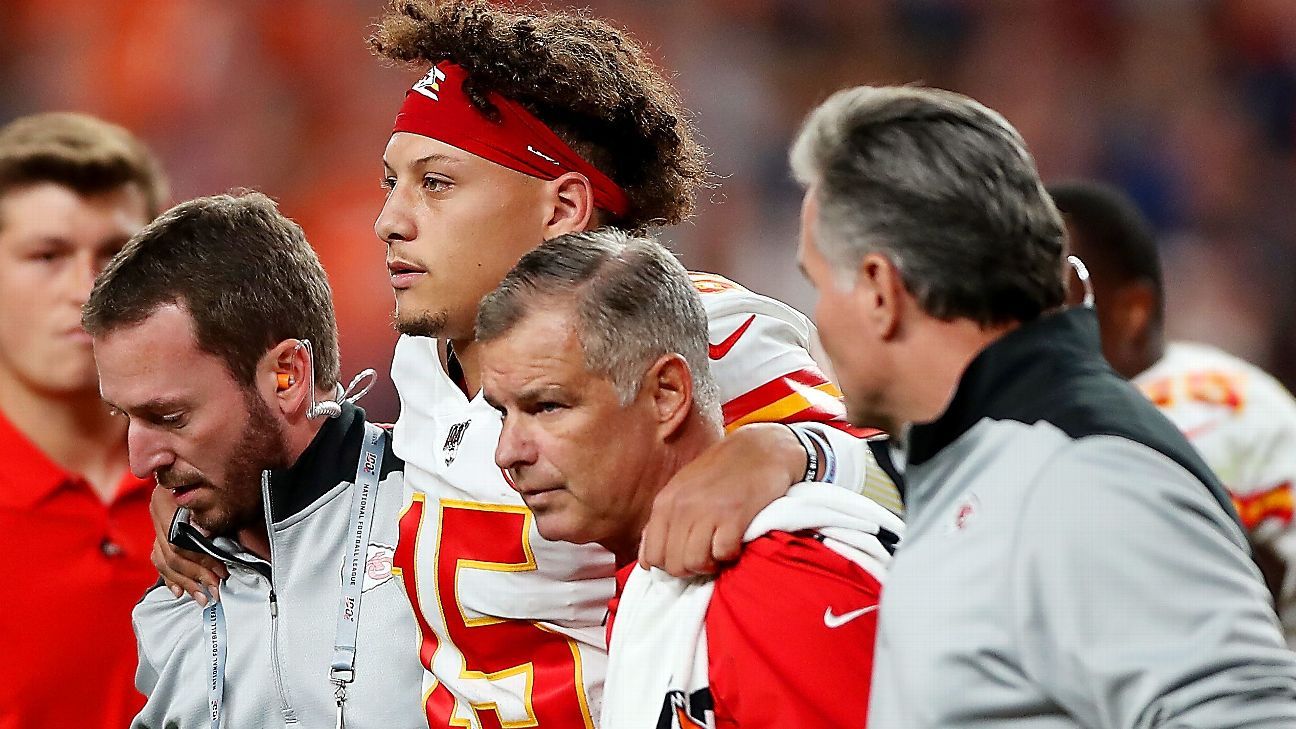
DENVER -- Kansas City Chiefs quarterback Patrick Mahomes was ruled out of Thursday night's game against the Denver Broncos after suffering a right knee injury in the second quarter.
The NFL's reigning MVP was injured on a quarterback sneak on fourth down with just over nine minutes remaining in the first half. As medical staff attended to him on the field, it appeared Mahomes' knee was straightened and popped back into place.
A cart came onto the field, apparently to take Mahomes for treatment. He was instead helped off the field by a couple of trainers. Players from both teams came by to offer encouragement.
Mahomes, 24, soon left for the locker room, walking under his own power but with a limp. He was in the X-ray room for only two minutes before the Chiefs ruled him out, according to the Fox broadcast. The team did not immediately offer details on the nature of the injury.
According to the broadcast, Chiefs coach Andy Reid said Mahomes was going to be OK because Mahomes told him so on his way off the field. The Chiefs' next game isn't until Oct. 27 against the Packers.
Mahomes entered Thursday's game hobbled by a left ankle injury he tweaked in a Week 5 loss to the Colts, when a teammate accidentally stepped on him. He played through the ankle injury in Sunday's loss to the Texans.
Veteran Matt Moore, who joined the Chiefs late in the preseason after backup Chad Henne broke his right ankle, replaced Mahomes.
Moore appeared in one game previously this season, throwing an incomplete pass against the Jaguars. Prior to that, he hadn't played in an NFL game since 2017 with the Miami Dolphins.
Barnes, Jackson to pay for funeral of slain woman
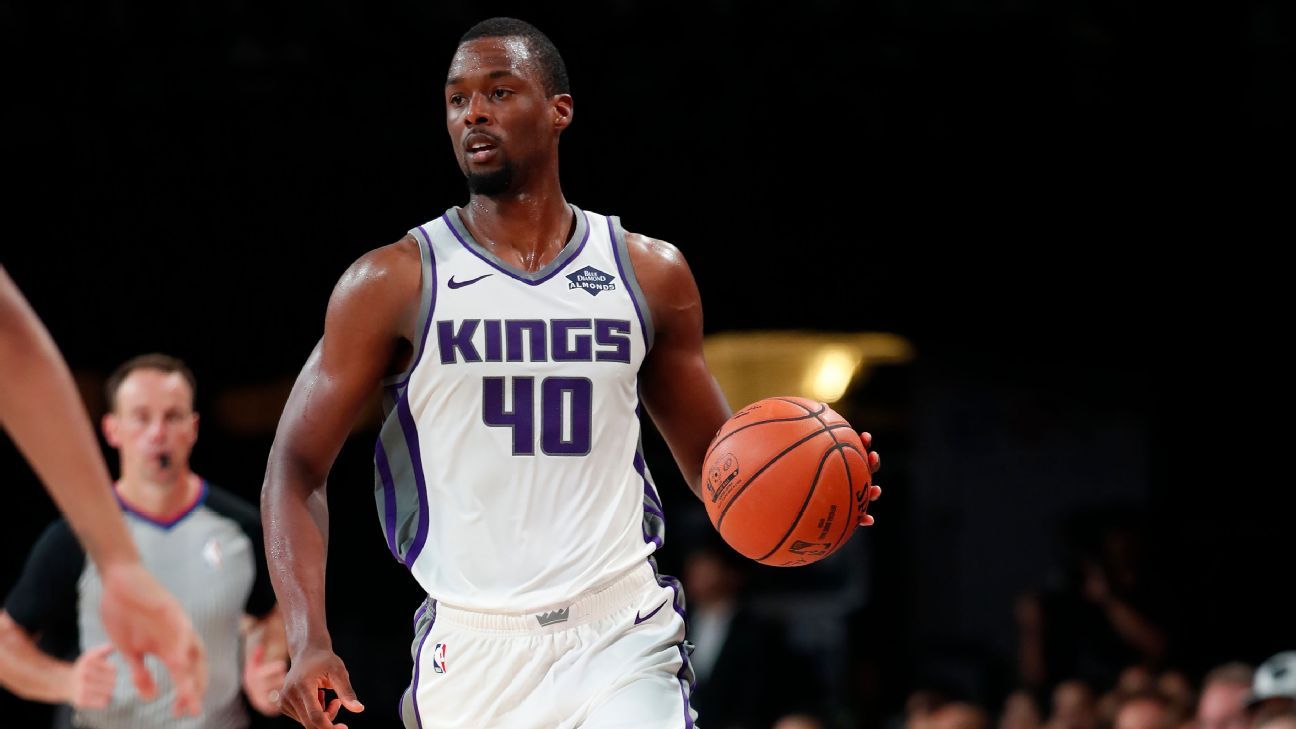
Sacramento Kings forward Harrison Barnes and his wife and Philadelphia Eagles defensive tackle Malik Jackson have offered to pay for the funeral of a Fort Worth, Texas, woman killed in her home by a police officer last week.
Atatiana Jefferson, 28, was taking care of her 8-year-old nephew Saturday when a police officer making a wellness check fired through the window of her home and killed her. The officer was responding to a call about an open door at the residence.
"My wife and I wanted to do something for that family," Barnes told reporters Thursday. "It was a tragic situation that happened. No one should be killed during a wellness check. But the biggest thing is anytime someone has to go through that, the last thing you want to have to worry about is trying to come up with the money for a funeral."
Barnes played for the Dallas Mavericks for two-plus seasons before being traded to the Kings in February.
"Anytime you come into a community, you always have a piece of that community with you and you want to give back," he said.
Barnes and his wife, Brittany, are covering more than half of the cost of the service, and Jackson is paying for the remainder, Lee Merritt, an attorney representing Jefferson's family, told the Dallas Morning News.
"It's about the family," Barnes, 27, said of the gesture. "It's about everything they're going through. Our prayers obviously are with them. It was a gesture my wife and I wanted to do for them."
Jefferson, who was black, was a graduate of Xavier University of Louisiana and was working in pharmaceutical equipment sales. Aaron Dean, the officer who killed Jefferson, is white. He has resigned from the department and has been charged with murder.
"It was unfortunate. It should never have happened. You think of wellness check not being something that's going to be fatal. So you want justice for the family. But at the same time, your heart goes out to the family that has to deal with that," Barnes said.
Barnes said his thoughts also went to Andre Emmett, a former NBA player who was killed in Dallas in September. Police are still searching for his killer.
"Just in general gun violence in Dallas recently. Andre Emmett, a guy that I played pickup basketball with for 2 1/2 straight summers, another unfortunate incident. When you see these types of situations continue to occur, you know that change has to happen," Barnes said.
Barnes said he had not talked to Jefferson's family. "We're just giving them space respectfully," he said.
Baker reportedly meets with Phillies for 2nd time
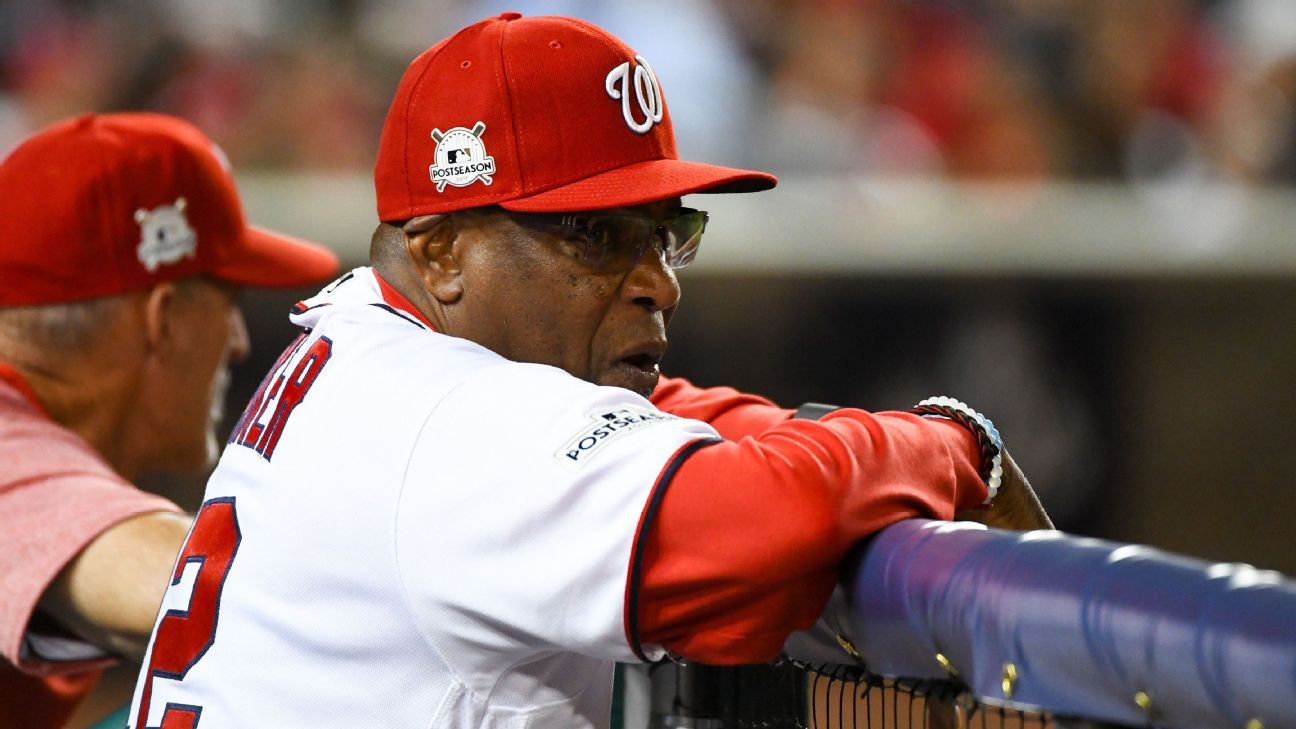
Dusty Baker and the Philadelphia Phillies reportedly met for a second time Thursday as the team continues to search for a new manager.
Baker initially interviewed for the job Wednesday, then had a second round of interviews Thursday, according to multiple reports.
"They got a good team, great city, I've been coming here for years," Baker told NBC Sports Philadelphia on Thursday. "The fans are great. So it's a great place to possibly come and work."
The Phillies also reportedly will have second interviews with Joe Girardi and Buck Showalter.
Baker most recently managed for the Washington Nationals, leading the team to the playoffs in each of his two seasons but losing in the National League Division Series as the higher seed each time. The Nationals were 192-132 in his two seasons, but Washington opted not to bring him back for the 2018 season.
His hiring in Philadelphia would reunite him with Bryce Harper, the former Nats slugger who signed with the Phillies last offseason.
Baker, 70, has spent 22 seasons as a big league manager overall, accumulating more than 1,800 regular-season wins with the San Francisco Giants, Chicago Cubs, Cincinnati Reds and Nationals.
He was a player in the majors for 19 years, including the 1981 season, when he won a World Series title as a member of the Los Angeles Dodgers.
He has never won a World Series as a manager. The Phillies most recently won one in 2008 and haven't been to the playoffs since 2011.
The team is looking to replace Gabe Kapler, who was fired last week after two seasons at the helm.

DAYTONA BEACH, Fla. – The NASCAR Whelen Modified Tour will return to Pennsylvania’s Jennerstown Speedway in 2020.
The news, first broken by RaceDayCT.com, will see the series return to Jennerstown for the first time since 2006. The event is scheduled for May 23.
The Jennerstown date is the third confirmed event at a venue that wasn’t on the schedule in 2019, joining Martinsville (Va.) Speedway at Iowa Speedway.
The track first hosted the NASCAR Whelen Modified Tour in 1987, with Jan Leaty going to victory lane. Others to earn Modified Tour wins at Jennerstown include Reggie Ruggiero, Tony Hirschman, Tom Bolles, Doug Heveron, Mike Stefanik, Steve Park, Mike Ewanitsko and Ted Christopher, who won the most recent race there in 2006.
Hinch to pull Astros off field if fans throw objects

NEW YORK -- Astros manager AJ Hinch says he will remove his team from the field if fans at Yankee Stadium again throw objects at Houston players.
Right fielder Josh Reddick said fans tossed water bottles, baseballs and other objects at him during Game 3 of the American League Championship Series against the Yankees on Tuesday night.
"I will pull the team off the field if we get in that situation again where bottles are being thrown and balls are being thrown and it becomes unruly," Hinch said Thursday before Game 4. "There's other ways to support your home team, and this place does as good a job as anybody to trying to police that while also trying to create an environment that's all pro-Yankees. It would be a very ugly scene for baseball, a very ugly scene for the Yankees, if one of our guys was hit by something from the upper deck. Something tragic could happen and nobody wants that."
New York fans erupted Tuesday after a replay review changed Edwin Encarnacion's infield hit leading off the eighth to a groundout. Houston went on to win 4-1 and take a 2-1 lead in the best-of-seven series.
"I went out on the field the other day, I wanted the umpires to know that it was becoming a dangerous situation," Hinch said Thursday before Game 4. "Our guys have reported both in the bullpen and in the outfield, you could see the stuff thrown on the field. There's no place for that. Both teams will agree. And it's really hard to stop fans from doing that. But it's also very dangerous. MLB is aware. We're aware."
Reddick homered off Luis Severino in the second inning for a 2-0 lead. Fans directed insults at him when he went to right.
"You throw a baseball hard enough and hit somebody in the head when they're not looking, it could do some damage to the player, so it's definitely disrespectful and at the same time very unsafe," Reddick said after the game.
He also said he was subject to verbal abuse.
"It's a matter of all kinds of different things here, but you're used to that for nine innings. Pretty standard," Reddick said. "They're all yelling at the same time, so it all kind of mumbles together."
Hinch: Talk of Astros whistling pitches a 'joke'
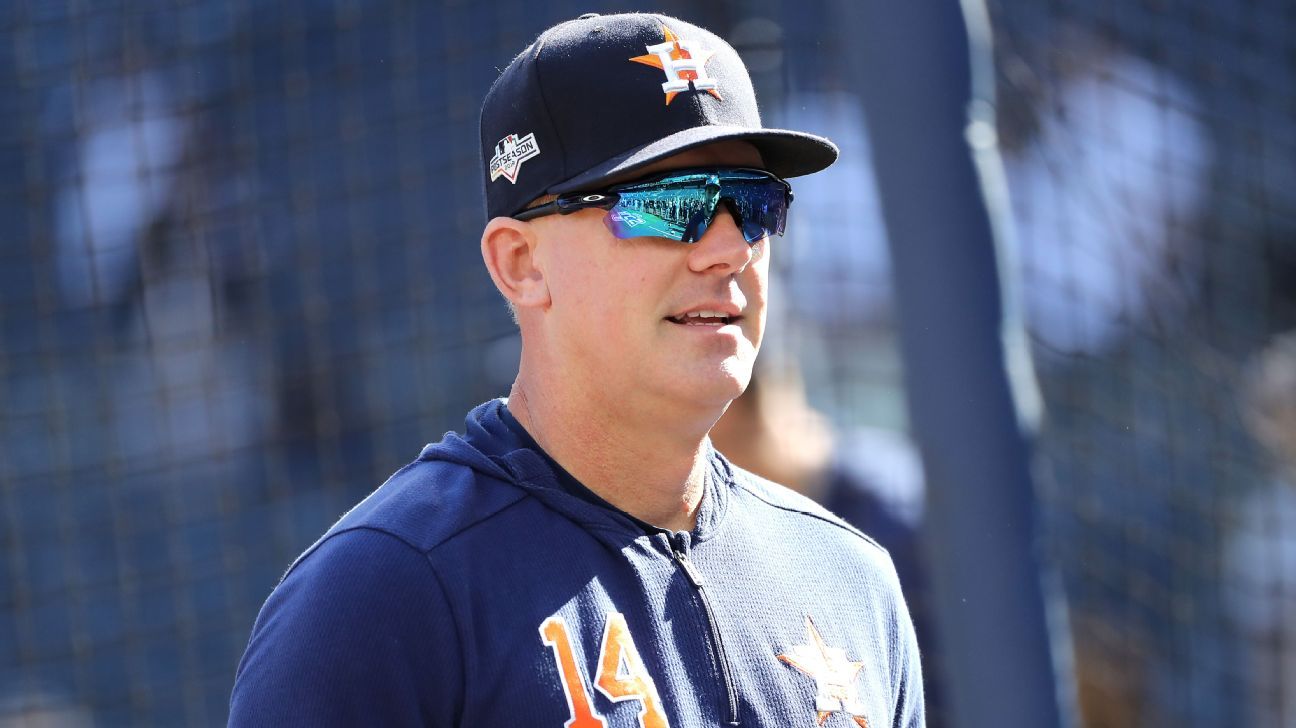
NEW YORK -- The quiet spaces between actual games in the ALCS have increasingly become filled with topics related to pitch tipping, sign stealing and other aspects of gamesmanship, much of it pointed at the Houston Astros. Finally, after one accusation too many, Astros manager AJ Hinch's patience with the subject seems to have worn thin.
"I think it's kind of funny,'' Hinch said during a teleconference on Wednesday, when Game 4 between Houston and the New York Yankees was postponed because of rain. He seemed less amused on Thursday.
"We talked about this the other day," Hinch said. "And in reality it's a joke. But Major League Baseball does a lot to ensure the fairness of the game. There's people everywhere. If you go through the dugouts and the clubhouses and the hallways, there's like so many people around that are (responsible for security).
"And then when I get contacted about some questions about whistling, it made me laugh because it's ridiculous. And had I known that it would take something like that to set off the Yankees or any other team, we would have practiced it in Spring Training. It apparently works, even when it doesn't happen."
The final straw for Hinch seems to be regarding accusations by the Yankees that the Astros were using whistles to signal pitch calls to their batters in Game 1, a 7-0 New York win. A source told ESPN.com that MLB has looked into the whistling charge and found no evidence of cheating. Hinch says that the scenario that was being looked into was virtually impossible given the security measures that the league has in place for the postseason.
"The game in question, we got three hits and no runs," Hinch said. "And so nobody heard it. You guys have audio, video, people in places and nothing -- and there's no evidence of anything.
"So, to the Yankees, there's nothing bad going on. Pitch tipping is a little bit of a different story. If you don't want us to know the pitch is coming, don't do something that demonstrates what pitch you're going to pitch or what you're going to throw. But they're doing the same thing."
For his part, Yankees manager Aaron Boone addressed the whistling issue by saying, "We're confident that we're buttoned up in every possible way and vigilant. I really don't think it's an issue."
However, while not referring to the Astros specifically, Boone did say there are limits to how communication within games should be shared.
"There's boundaries," Boone said. "Yeah, we could have a conversation for days on that. So, yeah, there's boundaries. There's things you're not allowed to do and things that are perfectly within the context of the game."
Astros pitcher Justin Verlander was asked if his club was simply good at getting into opponents' heads. He chuckled and said, "Maybe." However, he said that when it comes to deciphering the ocean of data and video captured from the games in baseball these days, everyone has the same tools.
"I think MLB has done an incredible job this year," Verlander said. "There's been someone in the video room every game of the season. Somebody is there full time. You're not allowed to have a live feed anywhere in the stadium that the players have access to. They check all that. I think that's been an incredible step forward for MLB to go against the trend of all this technology that's out there.
"They did what I think was the best thing possible to resolve whatever issue, paranoia teams have. Obviously it didn't resolve the paranoia -- it's still out there for every team."
For Hinch, the shame of it is that accusations such as the ones that have surfaced this week detract from a dynamic matchup between 100-win teams with a trip to the World Series on the line. He, for one, is done with the issue.
"There's nothing going on other than the competition on the field," Hinch said. "The fact that I had to field the question before a really, really cool game at Yankee Stadium is unfortunate. But we can put it to rest. That will be the last question I answer about pitch tipping or pitch stealing."
Wysh List: The most overrated advanced stats in hockey

Ron Hainsey was a plus-30 last season.
That means Ron Hainsey was sixth in the NHL in something, at a time when Ron Hainsey shouldn't be sixth in the NHL in anything. Go back 15 years, and a plus-30 would have been an indisputable measure of a defenseman's prowess. But we've gotten a lot smarter and savvier as hockey fans in that span. We know that the Toronto Maple Leafs gave up more shot attempts and shots on goal than they had themselves when Hainsey was on the ice at 5-on-5. And we know that, relative to his teammates, Hainsey's performance was inferior.
This isn't meant to pick on Ron Hainsey. It's meant to illustrate that advanced stats and analytics have helped expose and supersede the lazy junk numbers we relied on for decades. Well, that and a universal understanding that if a player is skating to the bench when a goal is scored by his teammate, he's a "plus-1" despite having nothing to do with the scoring play. Which is nuts!
For that reason, there's been a tendency to deify analytics. But even fancy stats have their ugly numbers. And the wonderful thing about the analytics community is that everyone believes that their kung fu is the best. One person's garbage stat is another person's gospel.
This week, I wanted to try to define which widely accepted analytics are seen as abhorrent as "plus/minus" by the community that developed them. So I'm turning the column over to a collection of stats analysts, hockey geeks and numbers-crunchers to give me the banes of their analytic existence. (As many as I could: Sadly, some NHL teams wouldn't let their analytics departments play in my reindeer games.)
Here are the worst fancy stats in hockey, as presented by the great women and men of the hockey analytics community.
Also in this week's Wysh List: Jersey Foul | Puck headlines
Winners and losers of the week
Alison Lukan, The Athletic
There's one stat that will immediately make me cringe and that's "with or without you," or "WOWY."
The idea behind the measurement is sound; how do we measure "chemistry?" People wanted to find a way to look at how a player truly performs and/or how much his teammates may or may not be influencing those contributions. Hence "with or without you"; how does Player A do with Player B? How does Player A do without Player B?
What people end up doing is taking any stat and comparing what that measure looks like in those two scenarios; with each other, without each other. The conclusion often becomes if the measure is worse without Player B ... well, then Player B is obviously a key to Player A's success.
Here are the problems with that line of analysis. First, you're comparing just two players when there are three other skaters out there from the same team. What about those players' impacts or lack thereof? Second, sample size. Unless we have significant minutes in both the "with" and "without" categories, you're not really using relevant data. Third, to really try and isolate a player, you have to look at a ton of possible combinations: Player A with B, C, D, E; Player A with B, D, E, F; and so on. And you can't sum these outputs; each scenario is discrete. Fourth, WOWY neglects context. Why were players put together or separated? Score? Injuries? Matchups?
Finally, and arguably most importantly. the biggest problem with using WOWY is that there are so many better ways to determine what an individual player's impact is. WOWY made sense when it was the best measure we had, but today, we can use relative measures that consider how a player performs relative to his teammates; or even better, we can use tools like player isolates on Evolving Hockey's regularized adjusted plus-minus (RAPM), which gives a much clearer view of a player's individual value. WOWY may be fun to say, it may bring back memories of a great U2 album, but other than that, it's not really something we should be using today.
Travis Yost, TSN
The biggest reason plus-minus is such a useless measure is that it's not exclusive to any one game state. Plus-minus includes all even-strength goals, goals with goaltenders pulled, and even short-handed goals. In other words: It is impossible to use plus-minus to make apples-to-apples comparisons across players.
So the hockey community came up with a brilliantly simple way to fix plus-minus, and that's to use goal percentage. Goal percentage -- full disclosure, it's a measure I use to this day -- simply aggregates the goals scored by a player's team with him on the ice, and divides out by the total number of goals scored, both for and against. We tend to use goal percentage for even-strength and 5-on-5 comparisons, and for descriptive purposes, it's quite useful.
The problem is that people still, to this day, use goal percentage as a meaningful data point for forecasting or predicting future goal percentage, and that is outstandingly dangerous. We already know expected goals and/or Corsi for percentage are vastly superior measures at predicting future goal percentage, both because the sampling data is substantially larger and the impact of small sample variance are substantially lower. We also know that goal percentage is a very weak predictor of future goal percentage for a multitude of reasons.
Context is key.
Micah Blake McCurdy, HockeyViz
My least favorite widely available stat -- I don't know which stats are "advanced" -- is save percentage.
Every goalie sees a different profile of shot difficulty, and counting every save as if it required the same amount of skill to save, as save percentage implicitly does, is silly. Cutting the data down to try to mitigate this (like using only 5-on-5 save percentage, or 5-on-5 "high danger" save percentage) generally does more harm than good, because it's throwing out so much data. We'd never say that it was sensible to compare the test results of two students who took two totally different tests, but we don't seem to mind doing it with our most basic goaltending stat.
Shayna Goldman, Bench Bosses
For me, it's the absence of good advanced goaltending stats, which force us to rely on statistics like goals-against average and save percentage to describe a goaltender's abilities.
Goals-against average, in particular, lacks context. It doesn't detail the goaltender's workload in terms of shots or shot quality, which is essential when evaluating a netminder. For example, John Gibson had a 2.84 GAA last season, which can give the impression that he was worse than a number of goaltenders. He also had the highest expected goals against in the league of 180.06, according to Evolving Hockey, and unsurprisingly the highest goals saved above expectation (26.9).
The latter numbers give us a much more nuanced -- and accurate -- view of the player's true capabilities.
So, what should replace GAA and become the widely accepted goaltending stat? Well, that's the question a number of analysts are trying to answer.
Expected goals and goals saved above expectation are both useful in evaluation, and so is goals saved above average (GSAA). Another metric worth exploring is delta save percentage (dSV%), though that improves one commonly used goaltending statistic and not the other. Micah Blake McCurdy's work on competent goaltending evaluation that he presented at the Seattle Hockey Analytics Conference helps assesses goaltenders as well.
Relying on a statistic like GAA to evaluate goaltenders allows for misinterpretation of their play, and the fact that there isn't just one goaltending statistic that stands out as a replacement that's both digestible for the traditional thinkers and accepted by data-driven analysts hurts goaltending analysis as a whole.
Ryan Stimson, Author, "Tape To Space"
It has to be "with or without you" stats. They simply don't tell people what they think they do. There are myriad factors that go into smaller samples of performance (competition, other teammates, deployment, etc). And it's not just who is on the ice with them, but who isn't that is a big factor in WOWY being misleading. If a team is strong at a certain position, a player further down the lineup will inevitably have his WOWY data compared to those of stronger teammates with whom he doesn't get a chance to play.
Similarly, teams with only one good option at a position will see their numbers inflated. A regression-based approach will be able to account for each of these factors in a much more comprehensive and reliable way than splicing data. Many people on social media often draw the wrong conclusions using these stats.
Josh and Luke, Evolving Hockey
It's "with or without you."
WOWY analysis normally goes something like this: "Leon Draisaitl has performed significantly better with Connor McDavid than without him. Look at his WOWYs and you can see he is clearly carried by McDavid." What this type of analysis misses, among other things, is that a player doesn't just play with one other player. That player plays with a combination of all other players on their team -- four at a time, in fact, during the 5-on-5 strength state.
So, when Draisaitl was playing with McDavid, who else was he playing with? And when he was not playing with McDavid, who else was he playing with? It would stand to reason that the three players who were not McDavid would have a bigger overall impact than one McDavid.
WOWY focuses on a single pair of players and does not account for every other player who was on the ice. While this could be somewhat informative when looking strictly at line combination or player pair evaluation, this type of analysis is often used for the overall evaluation of a player.
Ideally, a metric that accounts for each teammate a given player played with while also accounting for the amount of time that player played with each teammate in aggregate is a far superior method. Relative to teammate metrics, RAPMs (regularized adjusted plus-minus, which is available on our site) or Micah Blake McCurdy's isolated player ratings account for all teammates in a much more comprehensive way.
Rachel Doerrie, "The Staff & Graph Podcast"
For the record, I think goals-against average is legitimately the worst stat around, and the fact it is used to decide value of goalies is a joke. It's a team stat. But that's not an "advanced stat." So, moving on ...
I don't take umbrage with a specific stat per se, but how specific stats are presented. Stats without qualification don't tell nearly enough of the story. A good example is Corsi for percentage. I see tweets from various people saying this team's Corsi is this or this player's Corsi is that, or the expected goals is this or that. To me, if it isn't relative to his teammates or the score-adjusted situation, you're missing a huge chunk of the story. It's the equivalent of telling a story without a setting.
A team that is losing 4-1 should be generating a huge portion of the expected goals or possession; they're down 4-1! On the flip side, most teams leading 4-1 would be playing a 1-2-2 by that point and sitting back to hold the lead. Of course they are going to give up more. That's the score-adjusted side of things, which is a key part of whether or not a team or player played well. If you're losing and still getting out-possessed and out-chanced, well, that's no good. But your coach likely changes the style once you hold a lead or are down a few, and that's a very important qualifier. With relative stats, how good are you compared to your teammates?
Connor McDavid is a perfect example. Edmonton got obliterated last season when he wasn't on the ice, and they were extremely dangerous when he was. Even further, it tells you how awful someone's linemates are if they are plus-7% in relative Corsi and their teammates are minus-2%. How is there that big of a discrepancy? It does no good to say that "a player's Corsi was this, so he's bad," when you haven't considered he probably played seven of the last 20 minutes while they were up a couple goals and the other team was pressing.
That's a long-winded way of saying that plain stats with no qualifiers do almost nothing for me. I want to know how you are relative to your teammates and what situations you were in. If you were 65% in possession when your team was leading, that's really good. If you were 50% while your team was losing ... that's not good enough. I think if you don't use the score-adjusted or the relative numbers, you won't get the entire picture.
Brian MacDonald, ESPN
I don't like Corsi because the name is not descriptive of what it is, and because it doesn't include shot locations. Both of these attributes hurt its ability to be accepted by non-analysts in the hockey community.
For years all people talked about on social media was Corsi and how awesome it is, and how shot locations don't need to be considered because they don't help with predictions. That was not only untrue -- because shot locations do, in fact, help with predictive ability -- but counting a blocked shot from the point as much as a shot on goal from the slot turned off a lot of hockey professionals who are analytics skeptics.
First impressions matter, and the first "advanced stat" the skeptics heard of was Corsi, and they thought it was ridiculous.
Sean Tierney, Director of Analytics, Hamilton Bulldogs (OHL)
While thinking about this question, I decided to create a chart (as I'm wont to do) in order to prepare an answer. I tweeted out the charts (I'm wont to do that, too) as a way to talk about my least favorite advanced hockey stat: zone starts. Why don't I like it? It isn't because the stat can't be valuable or that the stat doesn't convey some information. It does both of these things. The problem is that zone starts is misinterpreted, misunderstood, and, therefore, often rendered meaningless. To wit:
Coaches control zone starts, not players
First, zone starts are sometimes used to describe a player's ability. We've all heard of the shutdown defenseman who gets all the tough defensive zone starts or the offensive wizard who's always used in the offensive zone. But zone starts are not about a player's ability at all -- they're about a coaching staff's perception of that player's ability.
For example, Golden Knights star and defensive genius Mark Stone has started in the D-zone as often as Islanders forward Tom Kuhnhackl, who has been one of the NHL's worst defensive forwards in the season's early weeks.
Stone is a Selke Trophy candidate, while Kuhnhackl is fighting for his NHL life one game at a time. But their D-zone usage rates show that they're deployed similarly by their coaches. It's not about their ability but their coaches' perceptions of their value to their respective clubs.
While hockey broadcasts continue to be comfortable asserting that zone starts are the context we need to understand which players are good defensive (or offensive) players, this stat really only tells us which players are being used in which ways by coaches, regardless of that player's merit. This leads to my second point.
Zone starts don't matter (much)
Even understanding that zone starts are a coaching decision, not a player decision or ability, the real kicker with this advanced stat is the degree to which it matters. It's common enough to hear that poor shot metrics for a player can be understood and accepted if that player routinely receives tough starts -- think of all those fourth-line, Jay McClement types who take tough faceoffs in the defensive zone, post questionable possession metrics, but are given a pass because they do the dirty work of playing hard minutes to free up the offensive stars to enjoy the cushier offensive zone starts.
The problem here is that zone starts don't actually matter that much. That's because they're much more infrequent than commonly believed. Micah Blake McCurdy has shown that if we adjusted for defensive zone (or offensive zone) start-heavy players, even in extreme cases of deployment, only 5% of players would see a change of more than 1% in their Corsi for percentage. That's astounding. And small.
This is because, on average, players start approximately 60% of all their starts on the fly (i.e., not in any zone in particular) and another 15% of their starts in the neutral zone. On average, only 25% of a player's zone starts happen in the offensive or defensive zone combined. It's much, much tougher for a coach to control which players are heavily deployed in defensive or offensive zone situations than an observer might believe at first blush.
Say there's one minute left in the game, defending a 3-2 lead, with the crowd collectively holding its breath as the home team tries to eke out 60 seconds of play without a goal against to secure a season-defining win; in those cases, coaches will deploy the players they believe to be their best defensive options. In these cases, zone starts really do matter.
Any other time? Zone starts don't matter much.
Meghan Hall, HockeyGraphs
Two stats that always make me grit my teeth a little bit are power-play percentage and penalty-kill percentage for evaluating special teams.
For one, all the special-teams opportunities (i.e., the denominator) aren't necessarily the same length, which makes raw comparisons less useful. Also, the percentages don't allow for nuance in terms of when the goals were scored; power plays that score quickly should get more credit, and vice versa for penalty kills.
Instead, I like to look at the goals per 60 minutes rate or, if you want to remove the influence of the goalie, shots per 60 minutes or expected goals per 60 minutes. The percentages are fine as a single data point, but I see too many people use them as the be-all and end-all stat for determining the quality of special teams and how they rank in relation to each other.
Stephen Burtch, Sportsnet
My least favorite advanced stat that I see people make use of is any of the "relative" stats, which are simply the stat in question while the player is on the ice minus the same stat for their team with them off the ice.
The reason this bothers me is there is zero context employed in the use of "rel" stats. Basically, if a player primarily plays with weak linemates (or strong ones) while they are on the ice, and the rest of the team is stronger (or weaker) when they are on the bench, then their "rel" stats will look worse (or better).
I would prefer people use "relative to teammate" versions of these stats (also identified as RelT). The difference being that they are a more complex version of a team-wide average "with or without you" statistic, weighted by the amount of ice time the player in question plays with all of their teammates.
"Relative to teammate" stats are far more complicated to calculate than "relative" stats, but they are also far more meaningful and informative.
Dimitri Filipovic, ESPN
I'd say my biggest sticking point is the general application of context.
I think nearly every metric has at least some kind of utility if it's equipped with the right level of nuance, but you can't just pick and choose based on a narrative you're trying to push. I remember the early days of the analytics era in hockey, where every piece of writing -- mine included, by the way -- would make sure to cite a player's usage with regard to the quality of competition they were facing, and the number of offensive zone starts they were receiving. Both of those still have value because they're two pieces to the puzzle, but there's also so much more to it that needs to be considered. Who someone is playing against is undoubtedly important, but it doesn't paint the full picture unless you're also considering who that player is routinely playing with. The same is true for zone deployment, simply because so much of the game is played on the rush.
These aren't necessarily analytical by definition because they've been around forever and appear on basic box scores, but because they're both statistics that I still see spewed on hockey broadcasts and ones that are totally dependent on context, it's worth reiterating here: Faceoff percentage isn't nearly as important as you'd think, and giveaways are entirely circumstantial.
To illustrate that point, here are the five best players by faceoff percentage last season (minimum of 100 draws taken): Tomas Nosek, Patrik Berglund, Jason Spezza, Derek Ryan and Travis Zajac. Among the bottom 10 you have names like Evgeny Kuznetsov, Elias Pettersson and Mathew Barzal. The faceoff itself is just one play in a series of events, and it shouldn't be treated as more important than the rest just because it happens to come first.
As for giveaways, here are some names that were in the top 10 of players who turned the puck over the most: Johnny Gaudreau, Brent Burns, Leon Draisaitl and Drew Doughty. Here are the five players who turned it over the least (minimum of 20 games played): MacKenzie MacEachern, Cody McLeod, Markus Hannikainen, Zac Rinaldo, and Josh Currie.
If you constantly have the puck on your stick and are trying to make good things happen with it, you're generally going to wind up giving it away on occasion. As counterintuitive as that may sound, it's not a bad thing.
Jersey Fouls
From Mike Chambers of The Denver Post:
Two really pumped young fans here at #Avs AM skate. Nice family from Cole Harbour set up by 87 and 29 pic.twitter.com/rBoSuAdFyJ
— Mike Chambers (@MikeChambers) October 16, 2019
There's something to be said for the adorable community pride on display as two youngins from Cole Harbour celebrate their native sons Nathan MacKinnon and Sidney Crosby. It might fly as a FrankenJersey were it not for the fact that the Avalanche and Penguins were playing that night. No room for fence-sitters. Total Foul.
Winners and Losers of the Week
Winner: Dave Tippett
Of all the big-name coaches who landed with new teams last summer, Tippett was oddly overlooked as a game-changer. Perhaps because most of us assumed that the Edmonton Oilers would be hot garbage no matter who was behind the bench. But while Connor McDavid has 17 points in seven games (!), Leon Draisaitl has 15 and James Neal has eight goals, Tippett's system has the Oilers at eighth in the NHL in goals-against average (2.71) after they finished 25th (3.30) last season.
Loser: John Hynes
The company line for the Devils is that Hynes requested that assistant general manager Tom Fitzgerald come down from the front office to behind the Devils' bench. Whatever the catalyst for it, it feels like a desperation move for a team that's gone six games without a win and blew a three-goal lead in the first game of a six-game homestand. Furthermore, it feels like that scene in "Office Space" where the Bobs come to the office to start evaluating each employee. "What would you say you do here exactly, John...?"
Winner: John Carlson
The Washington Capitals defenseman now has 14 points in eight games, third most in the NHL and first among defensemen. Why, it's almost like he knows that leading the league in points will get him that elusive spot as a Norris Trophy finalist!
Loser: John Klingberg
Rather than challenging Carlson & Co. for the points lead, the Dallas Stars defenseman has a single point in eight games and has a minus-7 in goals for/against at 5-on-5. Yikes.
Winner: Patrick Marleau
Whatever the 40-year-old forward has brought to the Sharks and their dressing room, his arrival has led to three straight San Jose wins and a reversal of their fortunes. It's the kind eyebrows. Gotta be the kind eyebrows.
Loser: Joe Pavelski
Not to pick on the Dallas Stars, but hoo boy is this a bad start. Pavelski finally scored a goal against Columbus on Wednesday, giving him a goal and an assist in eight games. But the Stars are 1-6-1, and one Minnesota Wild away from the conference basement as of Thursday. Ugh.
Listen To ESPN On Ice
Emily Kaplan and I start by looking at struggling teams in the NHL. Then, New York Rangers center Mika Zibanejad talks about his hot start, Artemi Panarin and building the perfect burger. Plus, goalie superlatives (31:00) and puck headlines! Listen here.
Falling For Hughes
Like the rest of the New Jersey Devils, it's been an inauspicious start to the season for No. 1 overall pick Jack Hughes, going six games without a point. Some of that has been bad puck luck, like the double posts he hit in a loss to the Florida Panthers, but much of it is an 18-year-old kid who weighs about a buck sixty-five learning the subtle difference between dangling a U.S. development team opponent and an NHL veteran, the latter being much more adept to stealing the puck and scoring the other way.
Luckily for Hughes, we'll always have Philadelphia fans around to kick sand in your face when you're down, as was the case for this briefly viral Twitter feed called Falling Hughes that set a tumble against the Flyers to different music.
Such as, rather incredibly, a cover of Daniel Powter's "Bad Day" by Alvin and the Chipmunks:
bad day by alvin and the chipmunks pic.twitter.com/L7031Yvsj6
— jack hughes falling to (@fallinghughes) October 10, 2019
Chin, up Jack Hughes. You have many more years ahead of you to earn the scorn of Flyers fans.
Puck Headlines
How is the NHL reacting to the raging controversy in the NBA over public comments about China and Hong Kong? "We rely on the good judgment of all of our on-ice and off-ice personnel to do what they think is sensible and responsible," commissioner Gary Bettman said, adding the league is "overwhelmingly proud" of the way players conduct themselves.
Gary Bettman on the future of sports gambling and the NHL: "People bet on their phones now. If we're going to have sports betting in our arenas, we need the latest technology. We need to get 5G into all our arenas. We have to make it a positive experience for the fans. If you don't want to bet, that's fine. But if you do, you want the app to work properly."
Jonathan Quick is off to a rough start, but his coach still has faith in him.
A couple left an AHL Iowa Wild game on Saturday night and were promptly assaulted by 20 juveniles.
The ongoing dispute between the Colorado Avalanche's rights holder and cable systems is having an major impact on local bars.
No one should be surprised by the Minnesota Wild's struggles. "This was always likely to be a team in transition: Too old or too young in all the wrong places, and even with a great coach, things probably weren't going to go great. There's still plenty of time to steer away from the rocks here, but for this particular group, it kinda seems like there are rocks everywhere."
Hockey tl;dr (too long; didn't read)
A great interview here with Pavel Bure. On that 1994 penalty shot in the Stanley Cup Final, does he think about it? "No, not really. I had a pretty good move, I scored against Calgary in double overtime with the same move, but Mike Richter is a great goalie. Usually when it's like that it's a 50-50 chance, but at that particular moment he did better than me." ($)
In case you missed this from your friends at ESPN
From holding to head-butting: Here are the most and least common penalties in sports.
Coetzee, Fox share lead after opening round of French Open

George Coetzee and Ryan Fox both signed for 6-under 65 Thursday to take the Day 1 lead at the French Open.
Each player made seven birdies against a lone bogey at Le Golf National, site of last year's Ryder Cup.
New Zealand's Fox is eyeing his second European Tour victory of the year after breaking through for his first title at the World Super 6 Perth back in February.
South Africa's Coetzee is a four-time Euro Tour winner who last took the Tshwane Open in March of 2018.
Parisians will likely be rooting over the weekend for Frenchmen Benjamin Hebert, who sits just one off the pace thanks to a first-round 65. Still chasing his first European Tour victory, Hebert has come out on the wrong end of not one but two playoffs this year — losing the China Open to Mikko Korhonen and the Scottish Open to Bernd Wiesberger.
In an odd bit of news, Germany's Marcel Siem disqualified himself Thursday after he was hit with 10 penalty strokes. Siem mistakenly thought preferred lies were in place and lifted his ball five times.

Ed Woodward has hit back at criticism of his Manchester United leadership by branding suggestions he picks which players to buy as "a myth" and "insulting."
Woodward has overseen a trying spell since taking over for chief executive David Gill in 2013, during which time United have slipped from Premier League champions to regularly missing out on a place in the Champions League.
Much of the fans' fury has been directed at the owners, the Glazer family, and the board -- particularly after a dismal start to the season that has seen Ole Gunnar Solskjaer's team collect just nine points from eight games and sit two points above the relegation places in 12th.
- ESPN Premier League fantasy: Sign up now!
- VAR in the Premier League: Ultimate guide
- When does the transfer window reopen?
- Premier League winter break: All you need to know
Some supporters have pointed the finger at Woodward for the club's underwhelming recruitment record since Sir Alex Ferguson retired six years ago, but United's executive vice-chairman has rejected the suggestion he handpicks players to sign.
"There is a myth that we have non-football people making football decisions, and I think it's insulting to the brilliant people who work on the football side in this club," said Woodward.
"Many of the senior staff on the football side of the club have been in their roles for over 10 years. Some of our scouts have worked with us for more than 25 years.
"We've expanded our recruitment department in recent years and we believe this now runs in an efficient and productive way.
"Player recommendations and decisions are worked on by this department and by the first team manager and his staff, not by senior management."
Woodward has also addressed concerns that the commercial side of the club -- which has remained healthy despite a lack of success on the pitch -- takes priority at Old Trafford over investment in the playing squad.
"Our commercial business allows us to reinvest in the football side," he said. "It's how these two interact with each other at Manchester United that results in us having a competitive advantage in this area.
"What's important is the commercial side is never allowed to take priority over the football side."
The impact of summer signings Harry Maguire, Aaron Wan-Bissaka and Daniel James -- identified by a revamped recruitment department -- has been a bright spot during United's miserable start to the season that could reach new depths on Sunday if Liverpool win at Old Trafford.
Solskjaer has managed just five wins from 21 games since being appointed permanent manager in March, and despite mounting pressure after defeat to Newcastle, Woodward insists the Norwegian is still the right man for the job.
"Ole's vision maps exactly to the core three football objectives we have," said Woodward.
"We must win trophies, we must play attacking football, and we must give youth its chance.
"The middle section of last season, after Ole's arrival, feels most relevant to what we want to achieve and where we want to be.
"We saw a team playing fast, fluid football, with a clear representation of the style and philosophy the manager wants."
While new signings Maguire, Wan-Bissaka and James have been early successes, Solskjaer has been left with a squad short in midfield and up front after the summer departures of Ander Herrera, Romelu Lukaku and Alexis Sanchez.
Lukaku and Sanchez were allowed to leave late in the window with no prospect of bringing in a replacement, but Woodward has hinted the decision was made for the good of the group.
"Ole has instilled the discipline back into an environment where we may have lacked it in recent years," said Woodward.
"He is building a squad that respects the club's history, in which players work hard and respect their teammates. No one is bigger than the club."
Meanwhile, Brandon Williams has signed a new contract at Old Trafford. The 19-year-old left-back, who made his first senior start against AZ Alkmaar in the Europa League, has penned a deal until at least 2022.
Zion has sore knee, will miss preseason finale
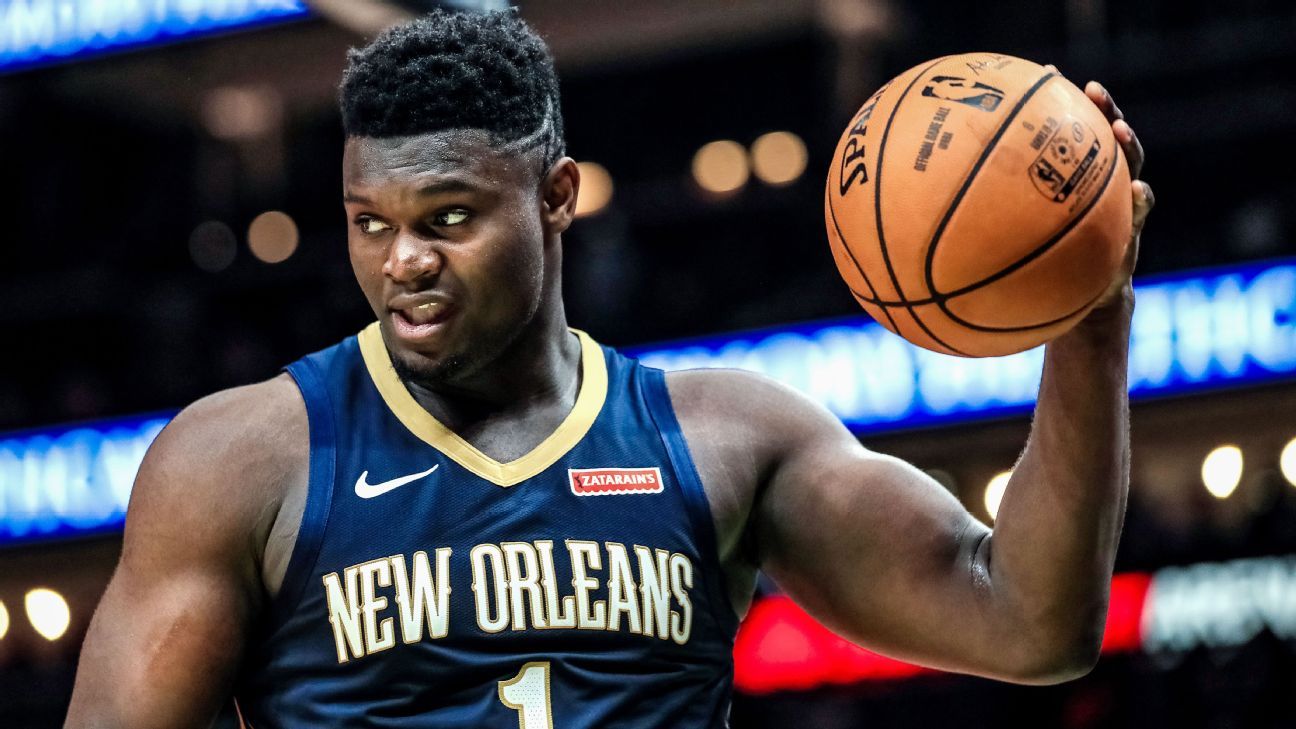
The New Orleans Pelicans announced that rookie Zion Williamson will miss the team's final preseason game because of right knee soreness.
The Pelicans traveled to New York to take on the Knicks on Friday, but Williamson did not make the trip. The team said Williamson will stay in New Orleans to undergo further testing.
No timetable for a possible return was given.
Williamson has appeared in all four Pelicans' preseason games averaging 23.3 points and 6.5 rebounds per game while playing 27.3 minutes a night.
In summer league, Williamson only played eight minutes for the Pelicans after suffering a minor left knee bruise. The team shut him down after the first game for precautionary measures.
Williamson hadn't missed any time in training camp and was seen walking around Pelicans' practice on Wednesday afternoon.
While at Duke last season, Williamson suffered a mild right knee sprain when his sneaker gave out seconds into a game against North Carolina. He missed six games total.


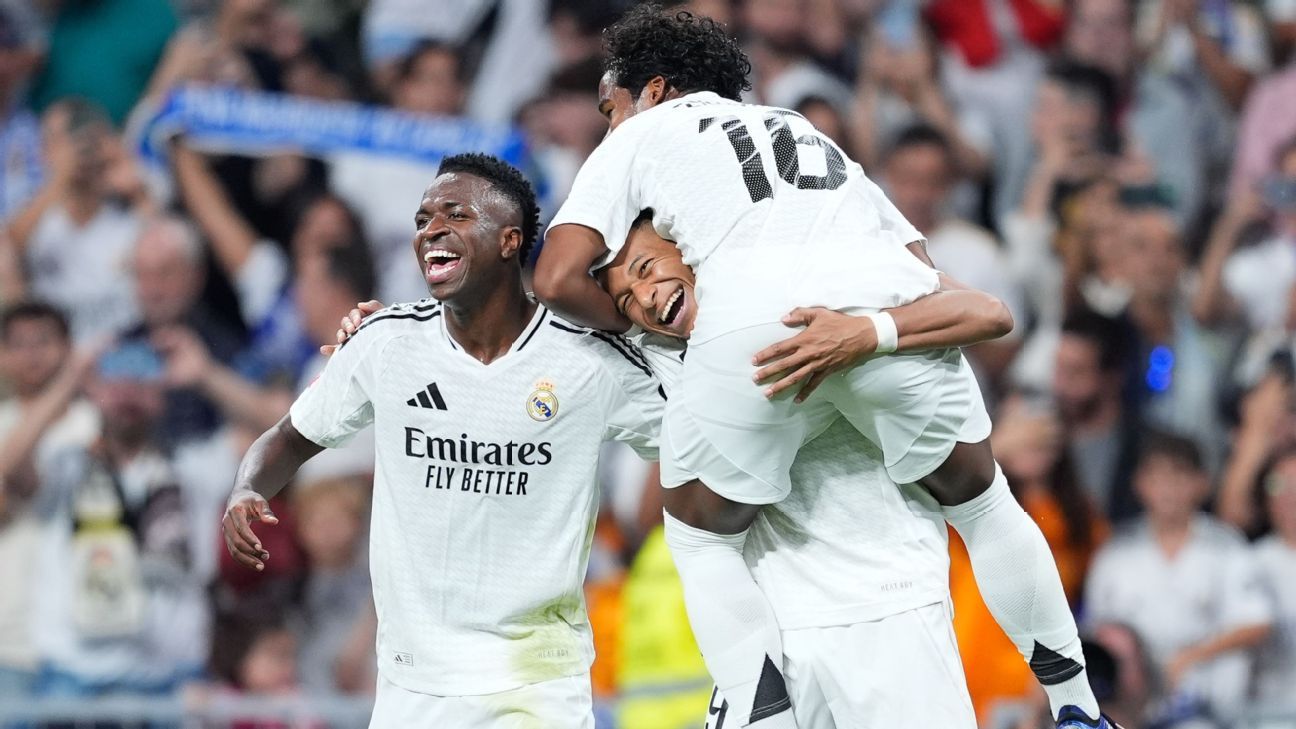












 Phone: (800) 737. 6040
Phone: (800) 737. 6040 Fax: (800) 825 5558
Fax: (800) 825 5558 Website:
Website:  Email:
Email: 






